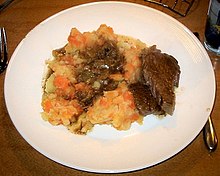Hutspot
This article needs additional citations for verification. (May 2012) |



Hotchpotch (or in Dutch: Hutspot () is a dish of boiled and mashed potatoes, carrots and onions with a long history in traditional Dutch cuisine.
History of the dish
According to legend, the recipe came from the cooked bits of potato left behind by hastily departing Spanish soldiers during their Siege of Leiden in 1574 during the Eighty Year's War, when the liberators breached the dikes of the lower lying polders surrounding the city. This flooded all the fields around the city with about a foot of water. As there were few, if any, high points, the Spanish soldiers camping in the fields were essentially flushed out.
The anniversary of this event, known as Leidens Ontzet,[1] is still celebrated every October 3 in Leiden and by Dutch expatriates the world over. Traditionally, the celebration includes consumption of a lot of "Hutspot met klapstuk/stooflap" (Hotchpotch with chuck roast/beef shoulder chops).
The first European record of the potato is as late as 1537, by the Spanish conquistador Juan de Castellanos, and it spread quite slowly throughout Europe from thereon. So the original legend likely refers to what the Dutch call a 'sweet potato' or pastinaak which is a parsnip; this vegetable played a similar role in Dutch cuisine prior to the use of the potato as a staple food.
The term hutspot (which can be roughly translated as "shaken pot") is similar to the English term hotchpot and Middle French hochepot, both of which used to identify a type of meat-and-barley stew that became synonymous with a confused jumble of mixture, later referred to as hotchpotch or hodge-podge. In noting the etymological connection, the Oxford English Dictionary mentions that the Dutch term hutspot is recorded from 1527, nearly 50 years prior to the Siege of Leiden.[2] In Melibeus, Chaucer wrote, "Ȝe haue cast alle here wordes in an hochepoche."
Similar foods
Related Dutch mashed potato dishes such as stamppot include boerenkool ("farmers' cabbage" or kale), andijvie (endive), spruitjes (brussels sprouts) and/or zuurkool (sauerkraut), generally with some rookworst (smoked sausage) or smoked bacon. The chunky texture of the dish distinguishes it from other more smoothly pureed potato-based dishes. More a hearty meal than a side dish, Hutspot is very popular during the long Dutch winter. The Swedish dish rotmos (root mash) is similar, substituting rutabaga (kålrot) for onions.
References
- ^ "Events - Netherlands American Society". Nassocal.org. Retrieved 2012-05-21.
- ^ Oxford English Dictionary (Third ed.). Oxford University Press. 2008.
{{cite book}}:|access-date=requires|url=(help)
